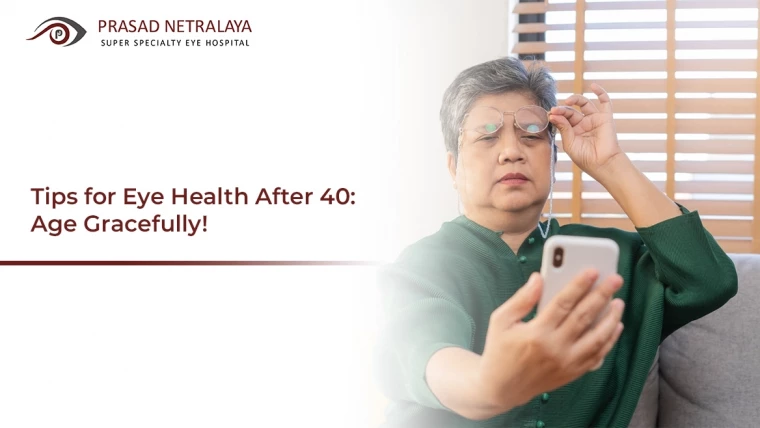Before exploring the various retinal detachment surgery aftercare instructions, it’s crucial to understand the fundamentals of the surgery first.
This guide will provide you with comprehensive instructions on how to protect your eyes after the surgery is conducted, ensuring the best possible recovery to get your long-term vision back on track!
Table of Contents
What is Retinal Detachment?
Retinal detachment occurs when the retina i.e., the light sensitive layer at the back of the eye, detaches or separates from the choroid (an underlying tissue that supplies it with oxygen and nutrients). This separation leads to the retina losing its ability to function, hence causing a potential vision loss.
Surgical procedure is important to reattach the retina and restore its function. Surgical techniques like scleral buckle, pneumatic retinopexy, and vitrectomy, are done to ensure the retina is in its proper form.
Immediate Post-Surgery eye care instructions:
- Protection: After retinal detachment surgery, your eye will be covered with a path for protection. So make sure to keep it intact until the doctor asks you to get rid of it.
- Normal discomfort: Experiencing discomfort, irritation, or itching in the eyes is normal after the surgery. There is nothing to worry about if it is just minor discomfort.
- Medications: To prevent discomfort or infections, your doctors will prescribe painkillers and eye drops. Apply it as per the doctor’s prescription.
- Following instructions: Follow your surgeon’s instructions on medication dosage, and take your medications on time.
- Hospital Stay: You may have to stay in the hospital overnight or longer, depending on how critical your circumstances are.
Symptoms during the first 2 weeks of surgery
You might experience certain symptoms during the initial two weeks after the completion of your surgery.
The symptoms include:
- Feeling of discomfort
- Floaters in the path of vision
- Flashes of light
- Blurred vision
- Swelling
- Redness or irritation
It’s important to take enough rest and follow the below tips to ensure you keep these symptoms in check.
Post-operative care tips:
- Rest Importance: Rest is crucial for retinal detachment surgery, taking ample rest can fasten your vision recovery process
- Activity Restrictions: Avoid strenuous activities, heavy lifting or bending over to prevent the retina from being detached again
- Face-Down Positioning: If you have undergone a procedure where a bubble was injected into your eye, you must keep your face downwards while performing any activity, for the duration prescribed by your doctor.
Regular Follow-Up Appointments:
Here are a couple of follow-up instructions to follow, post surgery:
- Attend regular follow-up appointments with your ophthalmologist to carefully monitor the healing process
- These visits are crucial because your eye specialist will examine your eye condition, remove any stitches and assess the status of your vision
- Communicate any concerns or symptoms to your doctor to ensure immediate treatment.
Recovery period for Retinal Detachment Surgery:
The average recovery time for retinal detachment ranges from 3 to 8 weeks. However, the exact duration entirely depends on the severity of the detachment and the kind of surgery performed:
- Pneumatic retinopexy: Recovery takes about 3 or more weeks
- Scleral Buckle: Recovery can go upto 4 weeks or more
- Vitrectomy: Recovery often takes 4 or more weeks, similar to scleral buckle
For an accurate estimation of your recovery time, it’s recommended to consult your doctor, as the period may differ from person to person.
Contact your doctor during an emergency:
If you face any severe symptoms during the recovery process, then you must consider contacting the doctor urgently.
Ensure to contact your doctor if:
- Your vision gets worse
- You experience severe discomfort or pain
- There is a major swelling in the eye
Sometimes, there are chances of the retina getting detached again even after complete recovery. In such cases, it’s crucial to contact your doctor promptly!
Also Read : Retinal Detachment: Types, Causes & Treatment
Keep your eye health in check with Prasad Netralaya’s eye specialists:
While symptoms of retinal detachment may sometimes be subtle or easy to overlook, it’s important to address them at the earliest. Whether you are looking for updated information or guidance on post surgery care, our goal is to equip you with blogs that ease your eye health journey.
From lending a hand to providing comprehensive care, Prasad Netrayala Hospital has shown its commitment to offering the best eye care solutions in Mangalore. For any questions or concerns regarding retinal detachment, feel free to contact our renowned eye specialists.
Schedule an appointment today and ensure the best outcome for your vision!
FAQs:
1. How long should I rest after retinal detachment surgery?
It is crucial to allow your eye to heal properly. Avoid activities that involve intense movement like heavy lifting, and tasks that require straining like cleaning. At least 4 weeks of proper rest is recommended.
2. For how long do you need to keep your face after retinal detachment surgery?
You may be required to keep your face down for several weeks after the surgery. This position ensures that the injected bubble remains in the fixed position until it naturally disappears.
3. What foods are beneficial after retina surgery?
Post surgery, it’s advisable to consume foods rich in omega-3 fatty acids like salmon, leafy green vegetables, lean proteins like chicken, dry fruits and whole grains.
4. How should I sleep while having a detached retina?
Lie on your side position, opposite to the location where the retina break has been identified. This position ensures the gas bubbles stay intact until it fully seals.
Dr. Vikram Jain, M.S. had his medical training (MBBS) from Kasturba Medical College, Mangalore, India. He did his master’s in Ophthalmic surgery from Kasturba Medical College, Manipal. He currently manages the Glaucoma department of Prasad Netralaya hospital.



